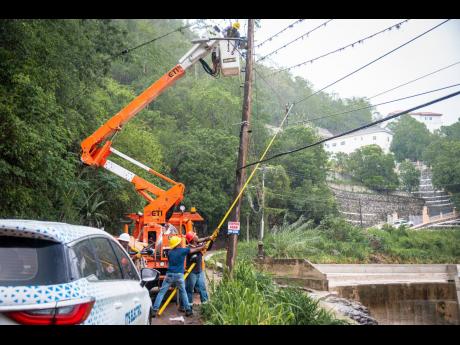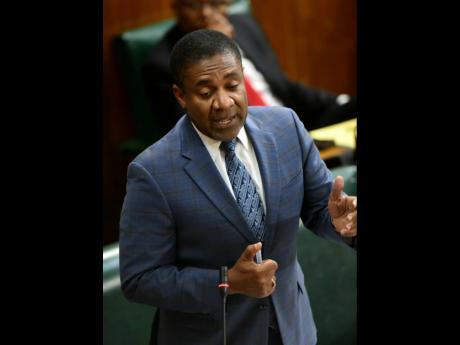Phillip Paulwell | That estimated bill
On Friday, July 19, I described the move by the Jamaica Public Service Company Ltd (JPS) as “unconscionable” as it would “provide the company with an undeserved windfall”.
The information I will present in this article supports this statement, and further identifies why JPS has acted immorally, as well as discuss JPS’ alternatives and issues surrounding the protection of JPS customers.
During a period of disaster, the JPS can apply to the Office of Utilities Regulation (OUR) and the OUR may grant the company a period of force majeure. It has happened twice in recent times, Hurricane Gustav and the COVID-19 pandemic.
Under the Electric Lighting Act, ‘ force majeure’ means any event or circumstance or combination of such events or circumstances that occurs in Jamaica, including acts of God, fire, explosion, chemical contamination, earthquake, flood, lightning, drought, tsunami, torrential rains, storms and other natural catastrophes, any strike, work to rule, go slow or other labour disturbances directly affecting the assets of the licensee.
Application for force majeure is a feature of the 2016 licence signed by me as minister, then. It is quite a usual feature in electric lighting licences and certainly removes no ‘moral authority’ to comment as stated by the minister in his desperate attack in an interview published today.
Most of this information is on the website of the OUR. Nowhere has it been said the process of force majeure was approved by the OUR and that can only be the fault of the sitting minister for running a shop in which regulated entities proceed without regard to rules and procedures. It is even more egregious when the minister unashamedly tells the public that the directors he appointed to caretake the public interest were unaware of the decision, already told to customers.
The JPS does not need to mass estimate bills as a means of protecting its revenue, as, any potential loss in revenue will be compensated for through its estimate of damage and loss via its claims against the Electricity Disaster Fund, as happens in periods of force majeure, as was the case in Tropical Storm Gustav.
It is also noteworthy that on page 7 of the Gustav Report, the JPS justified its claim for compensation due to loss of revenue (referred to as ‘fixed costs recovery’), but the OUR rejected it saying the revenue shortfall did not qualify as a recoverable cost under the Z-factor, proving that estimation of bills have been used as a revenue recovery method by the JPS. Damage from Gustav was estimated at $103,692,000.
WHY JPS ESTIMATES ACCOUNTS
• Customers are placed in routes and billing cycles based on where they are located. Hence billing cycles are tied to streets, communities, parishes, etc.
– Most cycles are 31 days, but the OUR allows JPS to bill for up to 35 days.
– The meter system is programmed with the read date for each cycle.
– For smart meters, the smart meter system automatically reads the meters on the programmed reading date. For other meters that are manually read, the meter readers assigned will read other meters on the scheduled reading dates.
– If on the reading date there is no power (or communication in the case of smart meters which can have communication issues), the smart meters will not produce a reading but previously recorded readings my be available to bill accounts.
– If there is no communication (as in the period after the storm) JPS can accept available readings to estimate customer usage.
Because billing cycles are tied to communities, it is easy for the JPS to use outage reports or data reported via the call centre or the MYJPS mobile app.
HANDLING ESTIMATION OF BILLS
The JPS and other utilities establish in their billing systems what is known as a tolerance level, that is, a percentage change in consumption levels accepted as a normal variation. For JPS, this is 30 per cent for commercial customers and 40 per cent for residential.
a) High reading – a per cent change of more than 30 per cent (residential) or 40 per cent (commercial) higher than the average of the last three actual readings that are considered normal readings (e.g., actual out readings because of a meter change cannot be used)
b) Low reading – a per cent change of more than 30 per cent (residential) or 40 per cent (commercial) lower than the average of the last three actual readings that are considered normal (e.g., actual out readings because of a meter change, e.g., cannot be used)
c) Zero readings – where the difference between the current reading and the last reading is zero
d) Negative reading – where the current reading is lower than the last reading producing a negative usage (this can happen where the meter is reversing)
e) No reading – meter is blank or there is no communication (e.g. during a power outage smart/digital meters may be blank or otherwise malfunction resulting in no communication with the meter although power exists)
f) Short billing period for which the meter reading/usage is too short.
There are approximately 400,000 smart meter customers with known billing cycles. For all customers, JPS can, therefore, identify communities and cycles whose power was interrupted, the period of interruption in days, and bill customers using the last available actual reading prior to the storm.
Among estimated customers, JPS can identify the cycles with low readings due to outages and accept the readings. If there is variation in the reading that exceeds the tolerance level because of the post-storm outage that is lower than normal, JPS will not be at a disadvantage because in the next billing cycle JPS will recover the unaccounted revenues based on readings.
CUSTOMERS’ OPTIONS
• JPS’s action of mass estimation of bills is unfair to customers, even during this post-disaster period. Further, JPS has not advised customers of the options available to them:
1. Customers can submit a high bill complaint/report via the MYJPS mobile app, that allows them to state the reason for requesting a revision of their estimated bill and even upload a picture of their meter showing the actual reading.
2. Customers can request an extension for the payment of higher-than-normal actual bills, that will allow them to pay a part of the bill without being disconnected.
Whether customers’ bills are actual or estimated, the system will automatically disconnect customers for full or partial unpaid balances, unless the customer contacts JPS and the bill is placed on hold or JPS suspends widespread disconnection under force or majeure circumstances.
Based on the provisions of their licence and the OUR service standards, JPS has not done right by its customers and the government and regulatory body have been weak.
We are approaching the fourth week after Beryl, yet significant pockets of Jamaica and most of St Elizabeth are still without power. JPS should not take their patience for granted by issuing higher bills when there is no service. Their patience is not inexhaustive.
Phillip Paulwell is member of parliament for East Kingston and Port Royal and shadow minister of energy and climate change. Send feedback to columns@gleanerjm.com


